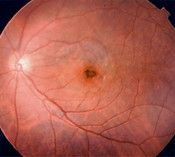Harvard Health Blog
Aspirin’s heart benefits trump possible small risk of macular degeneration

Many adult Americans take aspirin every day, often to prevent a heart attack. Headlines about a study published today linking aspirin use with age-related macular degeneration (AMD) may scare some aspirin users to stop, but that’s the wrong message.
In the study, aspirin’s effect on vision was small—far smaller than the lifesaving benefit it offers people with heart. “The benefits of cardioprotection are well established,” says Dr. William Christen, an epidemiologist and associate professor of medicine at Harvard Medical School. “There are too many unanswered questions in this study for it to impact the use of aspirin for cardiovascular disease.”
The study’s lead scientist, Dr. Barbara Klein, agrees. “Coronary heart disease is a killer,” emphasizes Dr. Klein, a professor of ophthalmology at the University of Wisconsin School of Medicine and Public Health. “If you are convinced that people need to be protected from heart disease with aspirin, you wouldn’t stop it because of this potential risk.”
A thief of vision
Macular degeneration occurs when something goes wrong with the macula, a small part of the eye’s light-sensing retina. The macula is responsible for sharp central vision. There are two forms. “Dry” macular degeneration is the most common. It is caused by thinning of the retina. Some people with it have no symptoms and are unaware they have the condition, others have vision loss.
In some people, dry macular degeneration progresses to “wet” macular degeneration. The name reflects the fact that abnormal blood vessels growing in the layers of cells beneath the retina leak fluid and blood, which can injure and scar the retina, causing loss of vision.
For dry macular degeneration, a cocktail of certain vitamins and nutrients can slow or even stop progression to an advanced, vision-robbing form. For the wet form, new drugs can stop or slow the growth of and leakage from abnormal blood vessels.
All eyes on Beaver Dam
As part of the ongoing Beaver Dam Eye Study, Dr. Klein and other researchers have been following nearly 5,000 adults living in the city and township of Beaver Dam, Wisconsin since 1987 to see how their eyesight changes as they age. Participants in the study were checked for signs of macular degeneration every five years. Among other questions, they were asked if they had regularly taken aspirin at least twice a week for at least three months.
In today’s Journal of the American Medical Association, the Wisconsin researchers reported that people in the Beaver Dam study were at slightly greater risk of developing late-stage AMD if they had had been regularly taking aspirin 10 years previously.
“Late stage” means the disease is far enough along to affect vision in one or both eyes. It could mean impaired vision or, eventually, blindness. The study links aspirin particularly to the wet form of AMD.
The added risk associated with aspirin use was small. After adjusting for factors that significantly affect risk for AMD, like smoking and age, 14 in 1,000 aspirin users developed late-stage wet AMD compared to 6 in 1,000 non-users.
Seeing the big picture
Keep in mind that the risk for developing macular degeneration balloons with aging. Should older adults shy away from aspirin?
The answer is no, especially for people who take a low-dose aspirin daily to prevent heart attacks. The small (and still unconfirmed) added risk of AMD is far outweighed by the rock-solid benefits of cardioprotective aspirin. But this study does raise the issue that even a simple, safe medication like aspirin isn’t something you want to be taking unless it will clearly do you some good.
The Beaver Dam study can’t really say for certain if aspirin actually causes late-life vision loss. As in all “observational” studies, researchers can only observe trends and try to link them statistically to plausible explanations—a bit like searching for suspicious-looking characters at the scene of a crime. Scientists try to control for factors that could affect the risk, like smoking and race, it’s hard to be sure what is causing what in the Beaver Dam study.
“They might be at higher risk for developing AMD for precisely the same reasons they are taking aspirin, like cardiovascular disease or an underlying inflammatory condition,” Dr. Christen says. “It’s difficult to disentangle whether this is due to aspirin or underlying risk factors that lead people to use aspirin.”
The American Academy of Ophthalmology recommends that everyone have a baseline comprehensive eye exam at age 40 to check vision, and look for early warning signs of macular degeneration and other eye problems, with follow-up exams as needed. For people 65 and older, the Academy recommends comprehensive exams at least every other year, though people with existing eye conditions might need more frequent follow up. Whether the latest Beaver Dam study will alter the Academy’s recommendations for people who take aspirin remain to be seen.
About the Author

Daniel Pendick, Former Executive Editor, Harvard Men's Health Watch
Disclaimer:
As a service to our readers, Harvard Health Publishing provides access to our library of archived content. Please note the date of last review or update on all articles.
No content on this site, regardless of date, should ever be used as a substitute for direct medical advice from your doctor or other qualified clinician.















